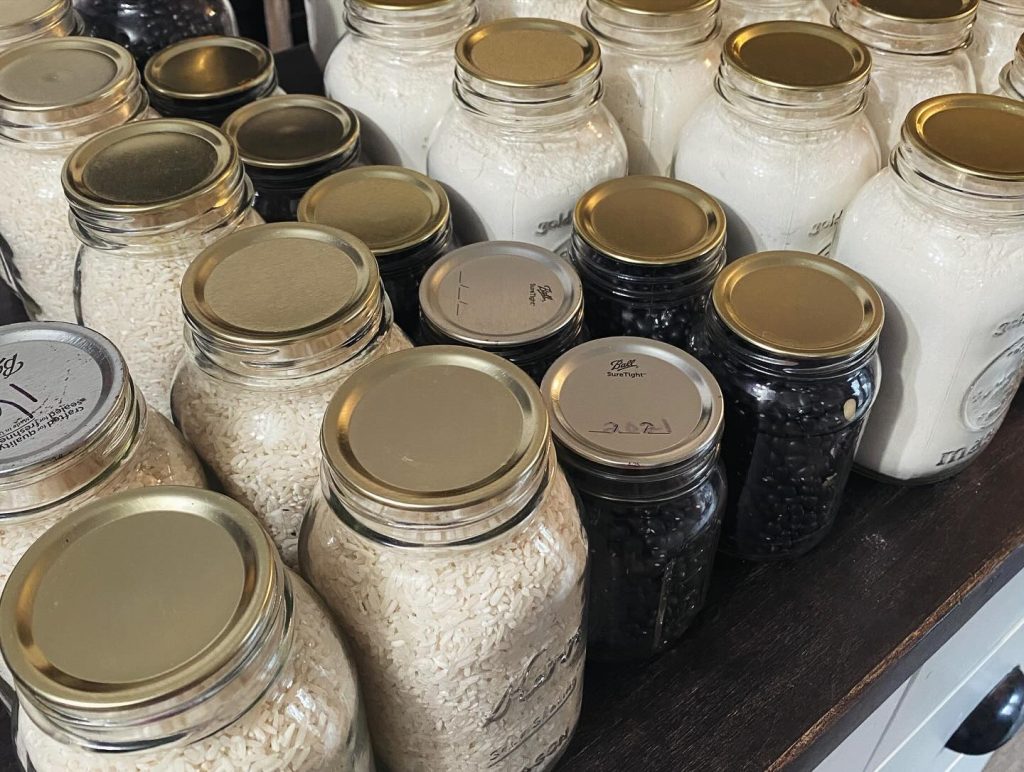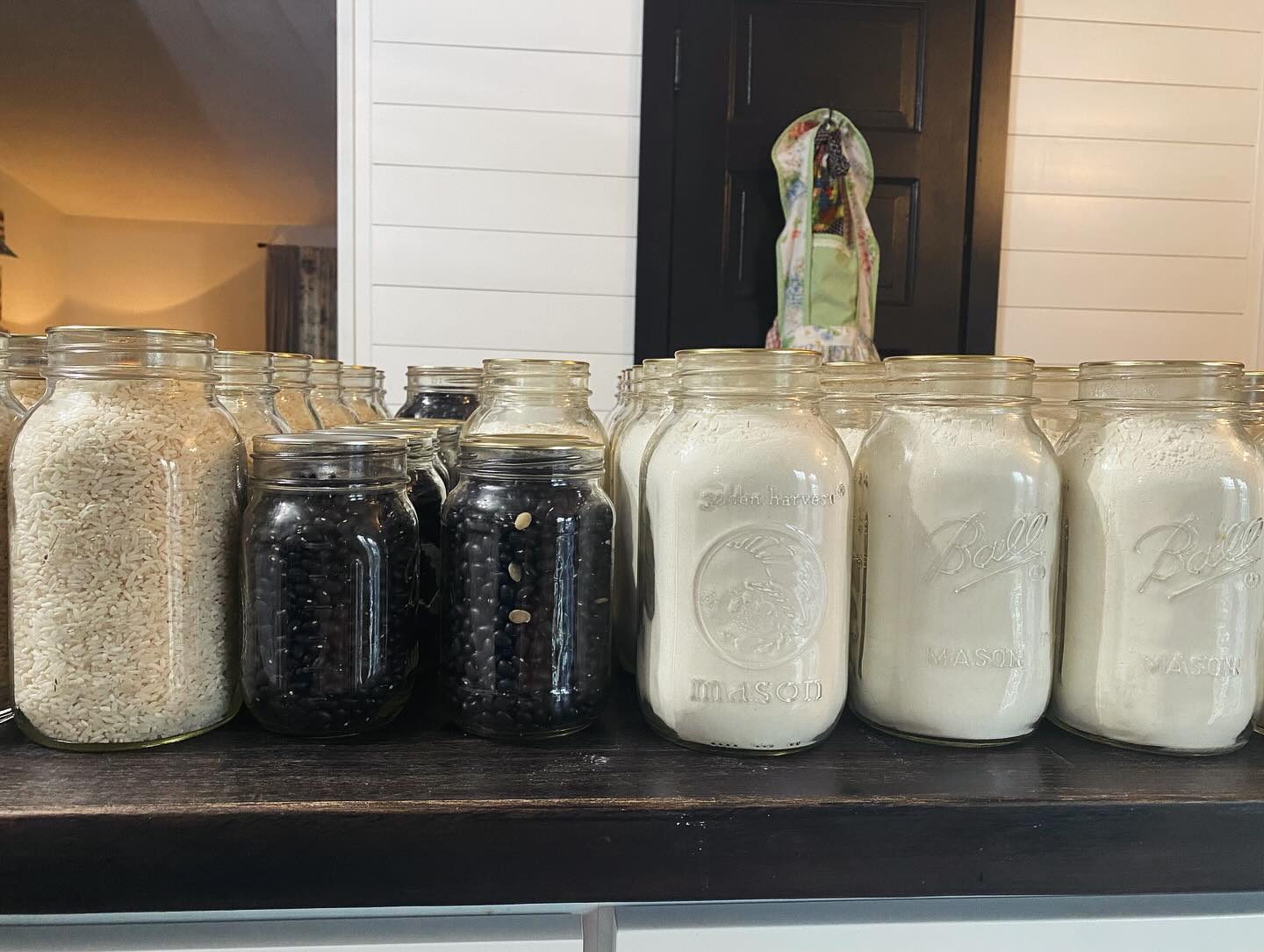**Some posts on the Wolterman Homestead contain affiliate links. When you make a purchase through an affiliate link, your price will be the same, but the Wolterman Homestead will receive a small commission. Thank you for your support!**
As we enter the first month of the year, January—affectionately known in homesteading circles as Canuary—brings a sense of anticipation and preparation for the months ahead. For those who embrace a homesteading lifestyle, this is the perfect time to reflect on the biblical principles of stewardship, provision, and preparation. One practical way to embody these principles is through the art of canning—specifically dry canning.
Dry canning, which preserves dry goods such as grains, beans, spices, and powdered milk, not only provides a long-term food supply but aligns with the biblical values of preparation, trust in God’s provision, and living responsibly. In this post, we’ll explore the biblical foundation of dry canning and outline key safety protocols for homesteaders looking to preserve their harvest for the future.
The Biblical Foundation of Preparation and Preservation
The Bible speaks frequently about provision and preparation for both times of plenty and scarcity. Dry canning, as a method of preserving food for long-term use, mirrors these biblical teachings.
1. Joseph’s Wisdom in the Famine (Genesis 41:46-57)
In the book of Genesis, Joseph interprets Pharaoh’s dream, predicting seven years of abundance followed by seven years of famine. Joseph’s advice to store surplus grain during the years of plenty helped Egypt survive the coming famine. His foresight was not only wise but also a form of stewardship, ensuring that resources were not wasted but preserved for future generations.
Dry canning follows this same principle: storing grains and other dry foods in a way that ensures their longevity when times of abundance may be followed by seasons of need. Just as Joseph saved the grain, we too can store food to prepare for unexpected future hardships
2. The Ant’s Wisdom (Proverbs 6:6-8)
Proverbs reminds us to learn from the ant, which works hard during the harvest and stores provisions for the winter. This simple creature prepares for times when food may be scarce. In the same way, dry canning represents wisdom—an effort to store food when it’s plentiful to ensure we can sustain ourselves during leaner times.
3. Jesus and the Parable of the Talents (Matthew 25:14-30)
The Parable of the Talents teaches us the importance of responsible stewardship. The servants who wisely invested their talents were rewarded, while the one who buried his talent out of fear was reprimanded. Just as the servants were entrusted with their master’s resources, we are entrusted with the resources God provides. Dry canning is one of the many ways we can responsibly care for and multiply the blessings we receive, ensuring that we have what we need and can share with others in times of abundance or need.
What is Dry Canning?
Dry canning is a process used to preserve dry goods in a sealed, airtight container, typically canning jars, to keep them fresh for long periods. Unlike traditional canning, which requires heating food in jars to kill bacteria, dry canning relies on removing air from the containers to prevent spoilage. The key to dry canning is the removal of moisture, which can lead to mold, and sealing the jars to keep out oxygen and pests.
Common foods that are ideal for dry canning include:
- Grains (rice, wheat, oats, etc.)
- Beans and legumes
- Pasta
- Salt and sugar
- Dried fruits and vegetables
- Spices and seasonings
These dry goods, when properly stored, can last for 5 to 25 years, making dry canning a valuable technique for long-term food storage.
Safety Protocols for Dry Canning
While dry canning is an excellent way to preserve food, it is important to follow safety guidelines to ensure the food remains safe to eat and properly preserved. The safety protocols outlined below are crucial for maintaining the integrity of your food and for reducing risks like contamination or spoilage.
1. Use Clean, High-Quality Jars and Lids
Always start with clean, sterilized jars that are in good condition. Check for cracks, chips, or any other damage that could affect the seal. Ensure you are using canning lids that are specifically designed to create a proper seal. Reusing old lids may not provide a secure seal, leading to spoilage.
2. Use Oxygen Absorbers for Long-Term Storage
When sealing dry goods in jars, use oxygen absorbers to ensure that oxygen does not enter the jar and cause the food to spoil. Oxygen absorbers remove the oxygen from the sealed jars, creating a vacuum-like environment that helps prevent mold growth, oxidation, and insect infestations.
3. Ensure Proper Seal and Vacuum
It is essential to create a vacuum seal when dry canning. This can be done by using a vacuum sealer or by filling jars with dry goods, leaving about an inch of headspace, and then sealing the jars tightly. You can also use a canning machine that removes air from the jar. Ensure that the lids are properly sealed, and there are no air bubbles inside.
4. Store in a Cool, Dry, and Dark Place
Once the jars are sealed, store them in a cool, dry, and dark place. Ideal storage locations include a pantry, basement, or cellar. Avoid storing the jars in areas that fluctuate in temperature, such as garages or attics, as this can negatively impact the preservation of the food. A stable environment ensures that the contents remain fresh for years.
5. Monitor for Signs of Spoilage
After storing your dry canned goods, periodically check for any signs of spoilage or damage. If you notice any bulging lids, unusual odors, or pests, discard the contents immediately. A damaged seal can lead to the growth of bacteria or mold, which can make food unsafe to consume.
6. Label and Date Your Jars
Label your jars with the date you sealed them, as well as the contents. This ensures that you can track the age of the food and use the oldest items first. Knowing when the food was sealed helps you maintain a rotating system of storage.
The Spiritual Connection to Dry Canning
Incorporating dry canning into your homesteading routine is not just about food preservation; it is an act of stewardship, faith, and preparation. Proverbs 21:20 teaches, “The wise store up choice food and olive oil, but fools gulp theirs down.” Dry canning reflects wisdom, ensuring that we have food for both the present and the future.
As we work with our hands, preserving food through dry canning, we are engaging in a biblically rooted practice of wise stewardship and preparation, just as Joseph did when he stored grain during the years of plenty. It’s an opportunity to trust in God’s provision while taking responsibility for the resources He has given us. Furthermore, in times of abundance, we can share our preserved food with those in need, fulfilling the biblical call to love and care for others (Luke 3:11).

Dry canning in the month of January isn’t just a practical way to prepare for the future; it’s a way to live out biblical principles of wisdom, stewardship, and trust in God’s provision. By following proper safety protocols, we ensure that our food is safe and preserved for times to come. Just as God provided for His people in the past, He calls us to use the resources at our disposal to care for ourselves, our families, and our communities.
Let this January, this Canuary, be a season of preparation, faith, and preservation—both spiritually and practically—through the art of dry canning.

“Moreover, God has the power to provide you with every gracious gift in abundance, so that always in every way you will have all you need yourselves and be able to provide abundantly for every good cause” – 2 Corinthians 9:8

Leave a Reply